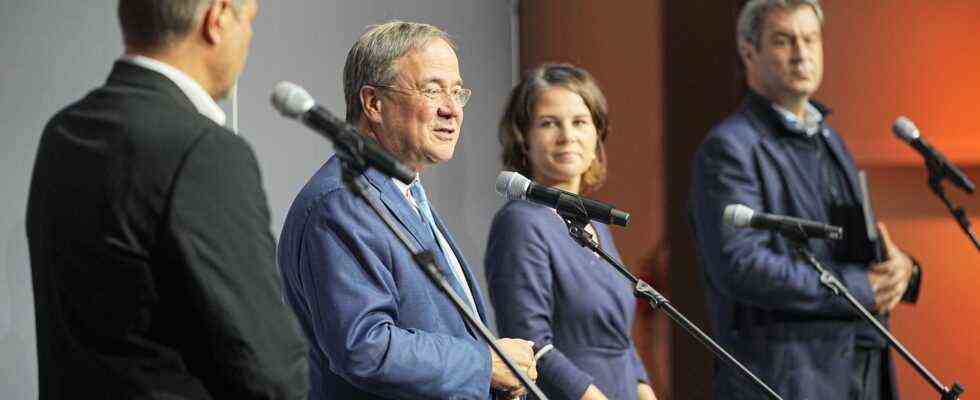analysis
Status: 05.10.2021 7:48 p.m.
Quiet in tone, a lot of subjunctive: Armin Laschet was emphatically advertising after the meeting of the Union and the Greens. For him, the option of an alliance with the Greens and the FDP is all or nothing.
For Armin Laschet it is the fight for his last chance. But he does not appear too combative – rather more quietly advertising in the key: During the conversation with the Greens, “no insurmountable opposites” became clear. “That would have to be deepened, it would be worthwhile.” Conjunctive. A carefully formulated offer for further discussions.
At their press conference, the top people from the Greens and Union took turns lined up. Laschet stands between Habeck and Baerbock, next to Söder. Habeck: “Like the Beatles.” A crane bridge hangs over their heads. The EUREF campus is one of those former industrial locations that are now the backdrop for modern projects. How much future the connection between the Greens and the Union has remains open after the first meeting.
For Armin Laschet, the coming weeks – maybe days – will be all or nothing. While the exploratory teams are sitting together, the first reports come in that Laschet wants to propose NRW Transport Minister Wüst as the new Prime Minister. A little later this information is official. The return bridge to Düsseldorf has now been finally torn down. In the federal CDU, the call for renewal has long since become unmistakable. But he still has one last chance: Laschet is tasked with forging a coalition with the FDP and the Greens.
“Mind exercise for everyone involved”
CSU boss Söder expresses interest in continuing the conversation. He calls the meeting – in comparison to the encounter with the FDP – “the same or even more exciting, because it is also a lot of brain teaser for everyone involved to further develop the future”.
Should the CDU and CSU have warmed the Greens for this idea, Baerbock and Habeck do not show it. Anyone who regularly listens to the statements after the various exploratory rounds knows the building blocks that those involved use when they have to stand in front of microphones but don’t want to say too much. Discussions are then called “constructive”, “factual”, “intensive”. The description “honest” suggests differences. Baerbock says of the previous exploration: “Responsibility includes reliability and trust.” This can be interpreted as a small swipe at indiscretions.
Most of the question attempts end up in a dead end. Baerbock and Habeck are asked whether a Jamaica coalition would be assessed differently if Laschet was no longer in charge. The Union’s candidate for chancellor looks to the left and right with a questioning smile. “We stay completely out of this, too,” replies Habeck. He had already said beforehand that he did not want to interfere in the internal affairs of the Union.
Black and green have long been considered likely
A few months ago the connection between the Union and the Greens was still very popular. An old idea seemed to come true. The mind games began in the 1990s in the so-called “Pizza Connection”, an informal discussion group of young MPs from the CDU and the Greens in a pub in Bonn.
And until a few months ago, well into the election campaign, it seemed clear that the next government alliance would consist of the Union and the Greens. The only open question was who would lead it: Armin Laschet or Annalena Baerbock. Ecos and conservatives together, that had charm, especially in view of the great challenge of an ecological transformation of the economy.
Both sides had worked towards this in a certain way: on the Union side, especially Markus Söder, who sometimes presented himself greener than the Greens when he hugged trees in photos or adopted the terms of a bee referendum in Bavaria one-to-one in a law.
In recent years, the Greens have increasingly sought proximity to the economy, founded an economic advisory board, met with leaders from industry and trade, and made it clear: Without the economy on board, the ecological transformation will not work. The reconciliation of ecology and economy, that was for a long time the story that made black-green or green-black so attractive to many.
Jamaica is not off the table for good
Now Laschet has to realize that he himself has no control over what remains of the hopes for Jamaica. He says: “Of course, the FDP and the Greens will decide whether the next way will go like this.” Both parties now want to evaluate internally the discussions of the past few days, the FDP tomorrow in a board meeting, the Greens today and tomorrow in various rounds. Then it should be decided together how to proceed. So far, however, there is no concrete timetable.
The Greens and FDP hold their negotiation cards close to their chests. With great caution it can be said: Jamaica is currently not considered to be the most likely variant, but it is not yet finally off the table, simply because that would weaken the negotiating position with the SPD.
It is quite possible that the Greens and FDP will begin with exploratory talks in a three-way constellation with the SPD. Depending on how these work out, parallel talks with the Union could then be started at some point as a means of pressure. All sides emphasize that they want to move forward as quickly as possible. The federal managing director of the Greens, Michael Kellner, expressed himself confidently: “I am optimistic that we will take a big step forward this week.”


